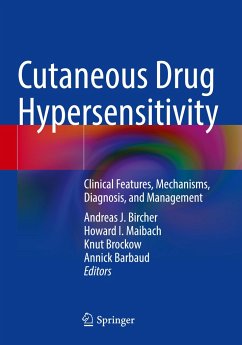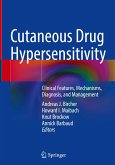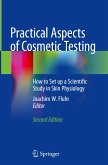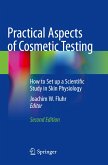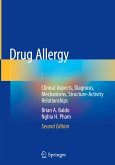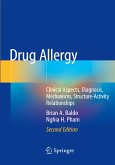Cutaneous Drug Hypersensitivity
Clinical Features, Mechanisms, Diagnosis, and Management
Herausgegeben:Bircher, Andreas J.; Maibach, Howard I.; Brockow, Knut; Barbaud, Annick
Cutaneous Drug Hypersensitivity
Clinical Features, Mechanisms, Diagnosis, and Management
Herausgegeben:Bircher, Andreas J.; Maibach, Howard I.; Brockow, Knut; Barbaud, Annick
- Broschiertes Buch
- Merkliste
- Auf die Merkliste
- Bewerten Bewerten
- Teilen
- Produkt teilen
- Produkterinnerung
- Produkterinnerung
This book covers all aspects of hypersensitivity to drugs, providing practical information for non-specialist physicians as well as addressing issues of interest to practitioners in different specialties and presenting the expert knowledge required by specialist allergists and immunologists. The opening, general section discusses basics such as clinical manifestations, histopathology, mechanisms, risk factors, drug hypersensitivity in particular populations, and the full range of diagnostic methods. The second part of the book provides concise information on the most important drug classes and…mehr
Andere Kunden interessierten sich auch für
![Cutaneous Drug Hypersensitivity Cutaneous Drug Hypersensitivity]() Cutaneous Drug Hypersensitivity169,99 €
Cutaneous Drug Hypersensitivity169,99 €![Practical Aspects of Cosmetic Testing Practical Aspects of Cosmetic Testing]() Practical Aspects of Cosmetic Testing116,99 €
Practical Aspects of Cosmetic Testing116,99 €![Practical Aspects of Cosmetic Testing Practical Aspects of Cosmetic Testing]() Practical Aspects of Cosmetic Testing85,99 €
Practical Aspects of Cosmetic Testing85,99 €![Anaphylaxis and Hypersensitivity Reactions Anaphylaxis and Hypersensitivity Reactions]() Anaphylaxis and Hypersensitivity Reactions85,99 €
Anaphylaxis and Hypersensitivity Reactions85,99 €![Anaphylaxis and Hypersensitivity Reactions Anaphylaxis and Hypersensitivity Reactions]() Anaphylaxis and Hypersensitivity Reactions118,99 €
Anaphylaxis and Hypersensitivity Reactions118,99 €![Drug Allergy Drug Allergy]() Brian A. BaldoDrug Allergy178,99 €
Brian A. BaldoDrug Allergy178,99 €![Drug Allergy Drug Allergy]() Brian A. BaldoDrug Allergy127,99 €
Brian A. BaldoDrug Allergy127,99 €-
-
-
This book covers all aspects of hypersensitivity to drugs, providing practical information for non-specialist physicians as well as addressing issues of interest to practitioners in different specialties and presenting the expert knowledge required by specialist allergists and immunologists. The opening, general section discusses basics such as clinical manifestations, histopathology, mechanisms, risk factors, drug hypersensitivity in particular populations, and the full range of diagnostic methods. The second part of the book provides concise information on the most important drug classes and guides the reader on how to proceed when patients present with a suspected reaction. For each drug class, the current level of evidence for use of the different diagnostic tools, including skin tests, provocation tests, and in vitro tests, is clarified, and management options, outlined. The inclusion of helpful tables and algorithms is designed to aid in decision making. Drug hypersensitivityis among the more complex allergological issues, and this book will meet the needs of general practitioners, internists, and specialists.
Produktdetails
- Produktdetails
- Verlag: Springer / Springer International Publishing / Springer, Berlin
- Artikelnr. des Verlages: 978-3-030-82745-8
- 1st edition 2022
- Seitenzahl: 372
- Erscheinungstermin: 10. Juli 2023
- Englisch
- Abmessung: 254mm x 178mm x 21mm
- Gewicht: 699g
- ISBN-13: 9783030827458
- ISBN-10: 3030827453
- Artikelnr.: 68217952
- Herstellerkennzeichnung Die Herstellerinformationen sind derzeit nicht verfügbar.
- Verlag: Springer / Springer International Publishing / Springer, Berlin
- Artikelnr. des Verlages: 978-3-030-82745-8
- 1st edition 2022
- Seitenzahl: 372
- Erscheinungstermin: 10. Juli 2023
- Englisch
- Abmessung: 254mm x 178mm x 21mm
- Gewicht: 699g
- ISBN-13: 9783030827458
- ISBN-10: 3030827453
- Artikelnr.: 68217952
- Herstellerkennzeichnung Die Herstellerinformationen sind derzeit nicht verfügbar.
Andreas J. Bircher is emerited Clinical Professor, and was until June 2018 Head of the Allergy Unit, and Vice Chairman of the Department of Dermatology at the University Hospital Basel, Switzerland. He is an accredited specialist in Dermatology/Venereology and Allergology/Clinical Immunology. He was awarded the Teaching Excellence Award of the University of Basel in 2017. From 2018 on he is Associated Professor at the Università della Svizzera Italiana in Lugano, Switzerland where he is involved in the planning and set-up of the new curriculum of the Master in Medicine, and is responsible for the module "Immune Disorders" including Dermatology, Allergology, Immunology and Rheumatology. Dr. Bircher is a cofounding member of the European Network on Drug Allergy (ENDA), a member of the Drug Hypersensitivity Interest Group (EAACI), and a member of the leading national and international scientific societies in the field. His clinical and research work focuses on drug hypersensitivity, and his Habilitation thesis on drug hypersensitivity was published in 1996 by Thieme (Arzneimittelallergie und Haut). Howard Maibach is a professor in the Department of Dermatology at University of California, San Francisco and an internationally acknowledged expert in contact and occupational dermatitis, skin exposure toxicity, allergies and skin disorders, and dermatopharmacology. Dr. Maibach has been on the editorial board of more than 30 scientific journals and is a member of 19 professional societies, including the American Academy of Dermatology, San Francisco Dermatological Society, and the Internal Commission on Occupation Health. Prof. Dr. med. Annick Barbaud, MD, PhD is University professor and Head expert for Dermatology and Allergology. After studying medicine at the Necker-Enfants Malades Hospital, Dr Barbaud joined the Nancy University Hospital. Passionate about immunology, she quickly specialized in allergology and focused her fundamental research on the subject of drug induced skin eruptions. Appointed University Professor, she heads a very active research unit whose work is internationally recognized. In 2016, she moved to Paris, becoming the head of the Dermatology and Allergy department of Tenon hospital in the AP-HP.Sorbonne University. This department is the most important for skin and drug allergies in Paris region. She is the secretary of the Board of the Drug Allergy interest group of the European Academy of Allergy and Clinical Immunology, secretary of the European Network for Drug Allergy, the Co-founder and past-president of the "FISARD-Toxidermie" group and the founder of the "Dermato-allergology" group of the French Society of Dermatology. She is also the past President of the Groupe d'Etude et Recherche en Dermato-allergologie (GERDA). Her main topics focus is on contact dermatitis, cutaneous adverse drug reactions and standardisation of allergy work-up in drug allergy. Prof. Dr. med.Knut Brockow is Associate professor and Head of the Allergy Unit at the Department of Dermatology and Allergology Biederstein, Technical University of Munich. After his Medical studies at the Rheinische Friedrich-Wilhelms-Universität Bonn with internships in Harare (Zimbabwe), Glarus (Switzerland) and Bonn, he passed the American state examination (ECFMG parts 1 and 2). Prof. Brockow completed his specialist training at the University Dermatology Clinic Hamburg Eppendorf and the Department of Dermatology and Allergology Biederstein, Technical University of Munich. His habilitation topic was on the topic "Mast cells, mediators and mutations in mastocytosis". His activities include a two-year Postdoctoral Research Fellowship at the Laboratory of Allergic Diseases (Head: Dr. Dean Metcalfe), NIAID, NIH, Bethesda, MD, USA as a fellow of the John E. Fogarty International Center, Bethesda, USA. Dr. Brockow is a past president of the European Network on Drug Allergy (ENDA), a member of theDrug Hypersensitivity Interest Group (EAACI), the chair of the drug allergy section of the German scientific Allergy society and the EAACI Exam Committee Chair. His main research fucus is on anaphylaxis, mast cell diseases and particularly drug hypersensitivity.
Part I. General aspects of drug hypersensitivity.- Chapter 1. Terminology, classifications, chronology.- Chapter 2. Epidemiology.- Chapter 3. Clinical manifestations: Cutaneous signs and syndromes.- Chapter 4. Clinical manifestations: Other organs (kidney, gut, heart, brain etc.).- Chapter 5. Danger signs in drug hypersensitivity and severity SCORES.- Chapter 6. Pathomechanisms in Drug Hypersensitivities.- Part II. Diagnostic methods.- Chapter 7. Skin tests.- Chapter 8. Serological tests.- Chapter 9. T cell tests.- Chapter 10. Basophil activation tests.- Chapter 11. Histopathology of drug induced exanthemas.- Part III. Management.- Chapter 12. Drug desensitization in immediate-type hypersensitivity.- Chapter 13. Documentation allergy card/pass.- Part IV. Drug hypersensitivity in specific populations.- Chapter 14. Children and Adolescents.- Chapter 15. HIV-Infection and AIDS.- Chapter 16. Oncology. immune checkpoint Inhibitors.- Chapter 17. MC releasing syndromes in drug hypersensitivity.- Part V. Eliciting Drugs.- Chapter 18. Penicillins.- Chapter 19. Cephalosporin Allergy.- Chapter 20. Other Antibiotics.- Chapter 21. Other Antiinfectious drugs.- Chapter 22. Analgesics and non-steroidal antiphlogistic drugs.- Chapter 23. Periinterventional hypersensitivity: Anesthetic drugs and materials.- Chapter 24. Muscle relaxants.- Chapter 25. Anticoagulants.- Chapter 26. Biological drugs.- Chapter 27. Hormones (delayed).- Chapter 28. Vaccines.- Chapter 29. Antiepileptic and psychotropic drugs.- Chapter 30. PROTON PUMP INHIBITORS.- Chapter 31. Diagnostic agents.- Chapter 32. Hypersensitivity to blood pressure agents.- Chapter 33. Iron preparations.- Chapter 34. Vitamins and supplements.- Chapter 35. Anti-tumor drugs / Cytostatics.- Chapter 36. Photosensitizing drugs.- Chapter 37. Topically applied drugs.- Chapter 38. Additives: Preservatives, Antioxidants (sulfites), Colors, dyes and other.
Part I. General aspects of drug hypersensitivity.- Chapter 1. Terminology, classifications, chronology.- Chapter 2. Epidemiology.- Chapter 3. Clinical manifestations: Cutaneous signs and syndromes.- Chapter 4. Clinical manifestations: Other organs (kidney, gut, heart, brain etc.).- Chapter 5. Danger signs in drug hypersensitivity and severity SCORES.- Chapter 6. Pathomechanisms in Drug Hypersensitivities.- Part II. Diagnostic methods.- Chapter 7. Skin tests.- Chapter 8. Serological tests.- Chapter 9. T cell tests.- Chapter 10. Basophil activation tests.- Chapter 11. Histopathology of drug induced exanthemas.- Part III. Management.- Chapter 12. Drug desensitization in immediate-type hypersensitivity.- Chapter 13. Documentation allergy card/pass.- Part IV. Drug hypersensitivity in specific populations.- Chapter 14. Children and Adolescents.- Chapter 15. HIV-Infection and AIDS.- Chapter 16. Oncology. immune checkpoint Inhibitors.- Chapter 17. MC releasing syndromes in drug hypersensitivity.- Part V. Eliciting Drugs.- Chapter 18. Penicillins.- Chapter 19. Cephalosporin Allergy.- Chapter 20. Other Antibiotics.- Chapter 21. Other Antiinfectious drugs.- Chapter 22. Analgesics and non-steroidal antiphlogistic drugs.- Chapter 23. Periinterventional hypersensitivity: Anesthetic drugs and materials.- Chapter 24. Muscle relaxants.- Chapter 25. Anticoagulants.- Chapter 26. Biological drugs.- Chapter 27. Hormones (delayed).- Chapter 28. Vaccines.- Chapter 29. Antiepileptic and psychotropic drugs.- Chapter 30. PROTON PUMP INHIBITORS.- Chapter 31. Diagnostic agents.- Chapter 32. Hypersensitivity to blood pressure agents.- Chapter 33. Iron preparations.- Chapter 34. Vitamins and supplements.- Chapter 35. Anti-tumor drugs / Cytostatics.- Chapter 36. Photosensitizing drugs.- Chapter 37. Topically applied drugs.- Chapter 38. Additives: Preservatives, Antioxidants (sulfites), Colors, dyes and other.

